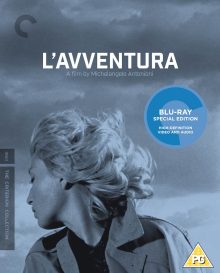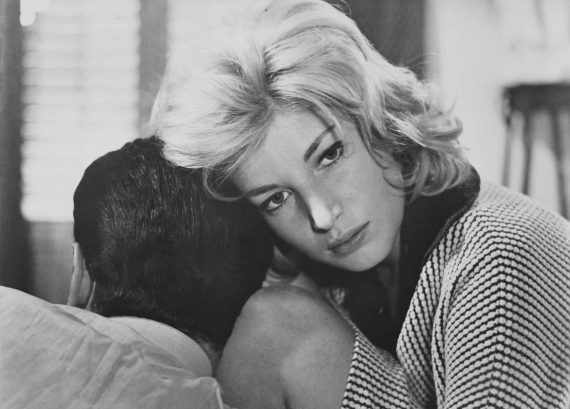 Director: Michelangelo Antonioni
Director: Michelangelo Antonioni
Screenplay: Michelangelo Antonioni, Elio Bartolini, Tonino Guerra
Starring: Gabriele Ferzetti, Monica Vitti, Lea Massari
Country: Italy, France
Running Time: 143 min
Year: 1960
BBFC Certificate: PG
Michelangelo Antonioni’s 1960 film L’Avventura is one of the most highly regarded films of all time. It’s one of the few titles to have been in Sight and Sound’s prestigious top ten greatest films list three times – second in 1962, only two years after it’s release, fifth in 1972 and seventh in 1982. It still stands in the longer most current list at #21 in the critics list and #30 in the director’s poll. However, it didn’t get off to the best of starts. Premiering at Cannes, the first screening was met with boos and jeers from the audience. However, the critics loved it and the film ended up winning the Jury Prize. Following its worldwide release soon after, the film became hugely popular too and helped revolutionise art house cinema across the globe.
Now I’ve never seen L’Avventura, but I’ve been aware of its reputation so it’s been on my radar for a while. Needless to say I jumped at the chance of reviewing this new Blu-Ray re-release as part of the prestigious Criterion Collection. The question is, will I side with the critics or the audience at Cannes?
L’Avventura sees a group of wealthy Italian socialites head off on a yachting trip together. One of the group, Anna (Lea Massari), is having doubts about her relationship with Sandro (Gabriele Ferzetti). She’s had a month alone and this trip is supposed to be their reunion, but she’s not convinced she wants to be with him anymore. Part way through the trip, on visiting a small island where the two have an argument, Anna goes missing. The group are all distressed at first, but most give up caring quite soon. Her friend Claudia (Monica Vitti) and Sandro remain troubled by what happened though and set out to try and find her. After a while however, the two grow closer together and form a relationship as they gradually forget their friend.
What sounds and starts like an intriguing mystery then becomes an unusual and illusive character study. Motivations, which often shift dramatically, are unclear and the film doesn’t tie itself up neatly at the end, so I can see why it maybe didn’t appeal to that first audience in Cannes. I must say, I did find the film a bit patience testing myself. I thought the first half was fantastic, but as the focus shifted away from the mystery of Anna’s disappearance and onto the relationship between Claudia and Sandro I started to lose interest. That’s not to say I didn’t appreciate the many qualities of the film though, throughout. I just didn’t really care about the central relationship, so found it difficult to stay focussed during the extensive running time.
It’s one of those cases where I can see why the film is considered a masterpiece, but I didn’t enjoy the whole experience. As mentioned though, the first half worked brilliantly for me. The island-set scenes are quietly foreboding, with the barren rocks and crashing waves painting a bleak picture. It doesn’t turn into a thrilling Hitchcockian mystery, but it remains strangely compelling.
The beauty of the film comes from Antonioni’s direction. His metonymic approach where the symbolism is the meaning, was revolutionary. Although not much literal action happens on screen, the symbols on display help tell the story and give us an insight into the characters and their problems. Beyond this intellectual plus point though, the film is striking from a visual perspective too. He doesn’t fill it with elaborate moving camera shots, instead he composes like a photographer or painter (which he did partake in outside of his film career). Each frame is carefully constructed and gorgeous to look at. Even the first half, which is largely just set on a boat and a barren island, manages to look hauntingly beautiful.
He seems to work well with actors too, allowing personal touches to shine through small gestures whilst remaining in control of their positions and movements. Vitti in particular is excellent in what is ostensibly the lead role. She’s magnetic to look at, not just through her obvious beauty, but through her personality which manages to break through in such subtle moments as mentioned before, as well as through her sexuality which Antonioni utilises to great effect.
I won’t waffle on too long about the film’s merits as it’s been discussed by others much more eloquently over the years. Instead I will end by saying that this enigmatic film wasn’t totally my style, so it’s not something I’m going to rush to see again, but it’s beautifully made and meticulously directed. Even if I got fidgety through the long and meandering running time, I could easily appreciate why it’s been hailed as a classic and I loved the first half, so I’m still going to rate it highly. Those with more of an interest in the damaged relationships of the wealthy and bored will get more of a kick out of it, but those interested in intelligent filmmaking will still have plenty to soak in.
L’Avventura is released on Blu-Ray on 30th May in the UK by The Criterion Collection. The label doesn’t disappoint in its world renowned reputation for treating titles with the respect they deserve, presenting the film in its original aspect ratio and providing a print which is clean but natural-looking.
You get a decent selection of special features too. Here’s the full list:
– Audio commentary featuring film historian Gene Youngblood
– Olivier Assayas on L’avventura, an analysis of the film in three parts
– Antonioni: Documents and Testimonials, a fifty-eight-minute documentary by Gianfranco Mingozzi from 1966
– Writings by director Michelangelo Antonioni, read by actor Jack Nicholson, plus Nicholson’s personal recollections of the director
– Trailer
– New English subtitle translation
– An essay by critic Geoffrey Nowell-Smith, Antonioni’s statements about the film after its 1960 Cannes Film Festival premiere, and an open letter distributed at the festival
Youngblood’s commentary is fantastic. It really helps you better appreciate what the film is doing and fills you in on the production and film’s reception. The period documentary is wild and loose, but all the better for it. It’s got bags of personality and feels like it’s capturing genuine reactions from its subjects, who are Antonioni’s colleagues/collaborators. It also shows some footage of the director at work which is fascinating to see. The section looking at L’Avventura shows how much of a nightmare the shoot was.
The Nicholson audio clips are a nice addition, as is Olivier Assayas’ piece. The booklet is worth a read too, giving further thoughts on the strengths of the film and providing more content directly from Antonioni.


